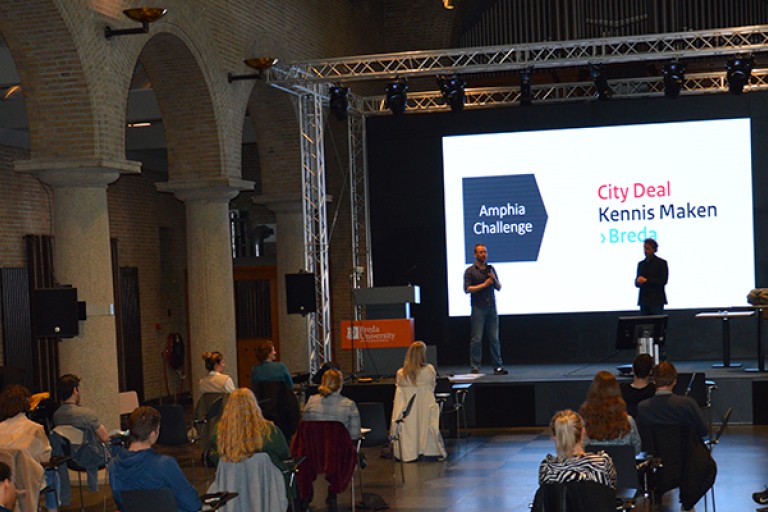
You’re all winners
Four enthusiastic student teams took up the Amphia Challenge in Breda and came up with concepts with which they want to facilitate the step from being an (ex-)cancer patient to returning to work.
'You’re all winners!' with those words Niels de Beer of Avans University of Applied Sciences closed the kick-off of the Amphia Challenge. Four enthusiastic student teams took up the challenge. Hardly four weeks later a winning concept was presented with which students want to facilitate the step from being an (ex-)cancer patient to returning to work.
The Amphia Challenge is one of the City Deal Kennis Maken Breda projects which the municipality of Breda – in conjunction with education institutes established in Breda – uses to engage students in social issues.
How right was the statement that Niels de Beer made because frankly, you have overcome quite something when you return to work as an (ex-)cancer patient, haven’t you? And in that case, any support is welcome. Unfortunately, it often goes wrong on that point. In the Amphia Challenge, four student teams worked out ideas in four weeks’ time to support the transition from being ill to resuming work. From research it appeared that too little attention is paid to that. Remarkable if you consider that one in three Dutchmen get cancer.
'We rather want you to think freely, use the creativity from your own study programme, and combine it with other students’ creativity'
Niels de Beer of Avans University of Applied Sciences
Considerable implications for work
During the kick-off at the Chapel of Breda University of Applied Sciences (BUas), Christine Bennink, project leader and an employee of Amphia hospital in Breda involved the students in the research done by the Dutch Federation of Cancer Patients Organisations (NFK). 'The implications for one’s job are considerable, and it is felt that way,' said Christine, 'but 75% of respondents taking part in the same research indicated they didn’t get any professional support. That’s what we would like to change.'
Campaign
The students who were starting to work on the challenge almost all attend the minor Gezond Samen Leven at Avans University of Applied Sciences. It was a good mix of students; they come from Groningen, study at HAN, Fontys, BUas or Avans and all of them put in their own knowledge, networks and ideas. The assignment was to think up a campaign that appealed to cancer patients. Many more frameworks were not given. 'We rather want you to think freely,' said Niels, 'use the creativity from your own study programme, and combine it with other students’ creativity'.
Sounding board
These other students, for example were two master’s students of Erasmus University Rotterdam who are doing their graduation project focusing on this theme at Amphia hospital. Having this experience, they added value to the expert group from the care sector and education sector because they are students themselves! The expert group functioned as a party students could turn to for advice and a sounding board for participants. The teams were given hardly four weeks’ time to work out their ideas, which they were then going to pitch to a jury. The venue for this pitch was the lecture hall of Amphia hospital, location Langendijk in Breda.
Various angles
From the pitches it was quite apparent that the issue had been looked at from various angles. Two teams mainly focused on employers, and another team explicitly focused on occupational physicians. Only the winning team built up its campaign around (ex-)patients themselves. Three out of four winners study at Avans. These are Chantal (Maatschappelijk Werk en Dienstverlening), Evelien (Social Work) and Ian (Academie voor Lichamelijke Opvoeding). The fourth winner is Ruben, who is a student of Built Environment at BUas. He opted for this broadening challenge to earn credits towards completing his free electives.
Well attuned to each other
'I am really very happy with the jury’s comments,' Chantal says with a smile, 'we’ve learnt a lot from each other, coming to think of the fact that we didn’t even know each other some four weeks ago!' In the jury’s opinion, the group was ‘the most complete, and very professional. 'You can see they’re really well attuned to each other,' said the chairperson of the jury, 'and they’ve taken the right actions.' On the basis of (desk) research, the students observed that a doctor only carries out activities aimed at treatment, and an occupational physician often has insufficient knowledge of the specific context. Therefore, the winning team proposed to give patients the tools to raise the subject with the occupational physician and employer self-consciously.
Putting the patient’s story centre stage
One of the tools they want to use is a website with experience stories, a sort of plan of approach and online self-help modules that help (ex-)cancer patients to stand firm. They have already worked out the broad outlines of such a website. The patient’s story is centre stage in their problem-solving approach. That is what Marco van Leeuwen of BUas already emphasised during the kick-off. 'It’s mainly about being human as well, about showing compassion; just imagine how you’d like to be treated in such a situation.'
Pressure cooker
If it were up to Niels de Beer, this challenge will certainly have a follow-up. 'It’s wonderful that so many different people work together on such a project, but it’s always challenging to fit it in the curriculum. Therefore, we’ve opted for a rather short period. Then it works like a pressure cooker. Marco and I are certainly going to have a look at whether we can really have the concept worked out into a graduation project, so Amphia will have an extra tool available as part of its aftercare services for its patients.'